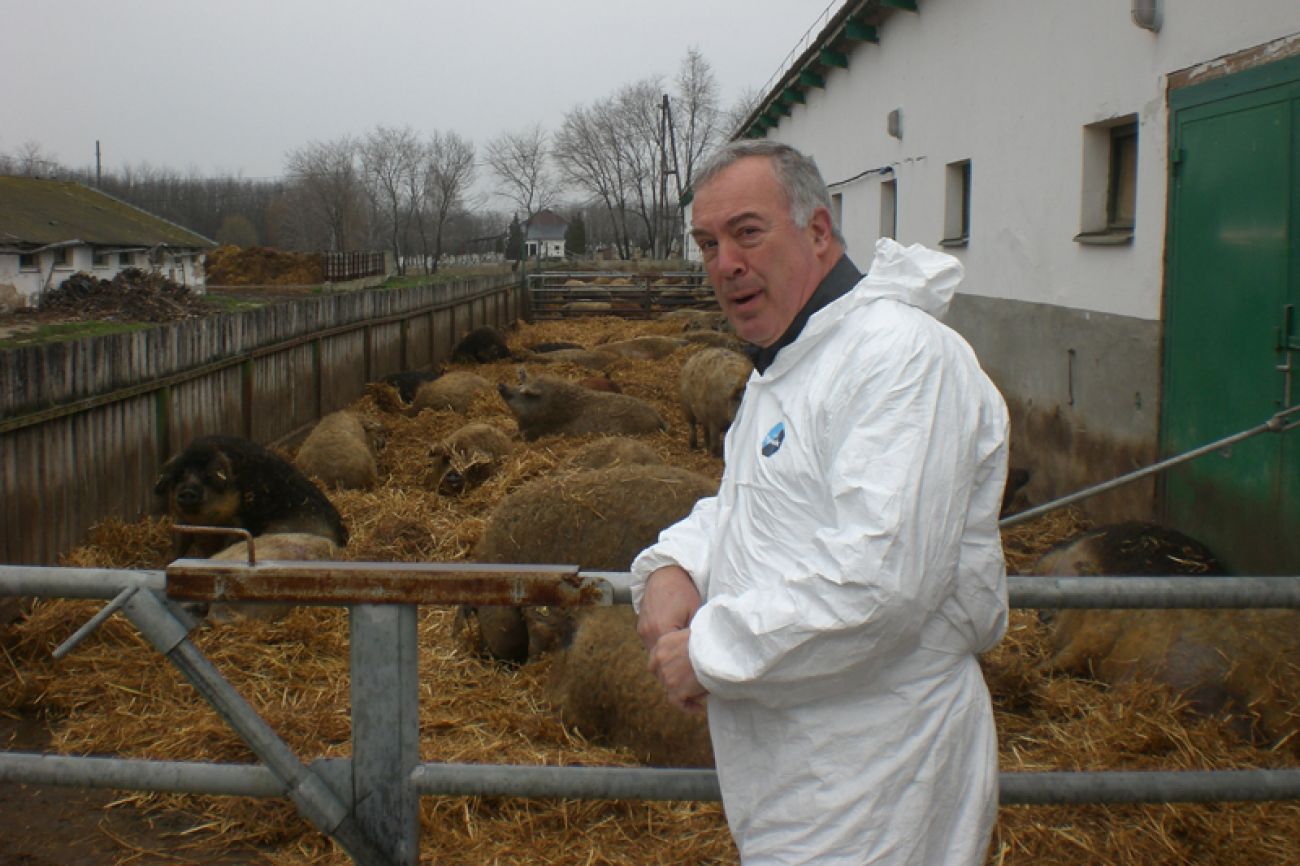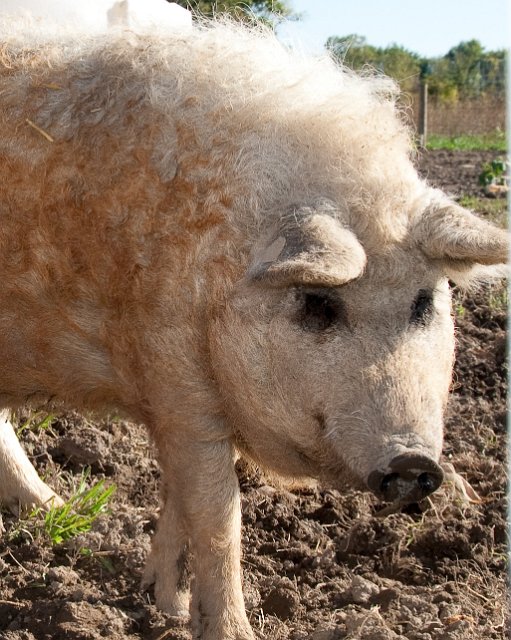How a Michigan entrepreneur overcame pork politics

Marc Santucci’s long experience of working in international trade came in handy, strangely enough, when he stepped out of that world several years ago and became a Michigan pig farmer.
His effort to import blond Mangalitsa pigs from Hungary to Haslett pulled him into lengthy talks with members of Congress and U.S. Department of Agriculture officials before the pigs were allowed to enter the country this year.
The curly-hair pigs, which nearly became extinct in the 1970s, are prized by foodies for their creamy, marbled-fat and rich flavor.
Prior to getting into the food business, Santucci founded Elm International, an East Lansing-based auto supplier consulting and market research firm that specialized in tracking Asian auto activity in the United States.
Previously, he served as former Gov. James Blanchard’s top international trade development adviser. Santucci, 62, spoke recently with Bridge correspondent Rick Haglund about life on the farm.
Bridge: You went from being an auto supplier market researcher and consultant to being a pig farmer. Is this a “Green Acres” sort of thing?
Santucci: Food has always been my first love. I worked in the auto industry to pay for the food. (Laughs.) It wasn’t a career transition in the traditional sense. Part of it was that I was getting older and wanted to do something different.
Bridge: How did you get started?
Santucci: I had been a partner in a company called Earthy Delights, which sold food products to high-end restaurants. I was helping them import olive oils and balsamic vinegars to the United States. But Earthy Delights got hurt a lot during the recession in 2008. The high-end restaurants it sold to got whacked.
It’s easier to find new products to sell to existing customers than it is to find new customers. I got interested in selling unique proteins, so I took the bull by the horns, so to speak, and got on the Internet to see what I could find.
Bridge: You found pigs?
Santucci: I started out looking at blue-footed chickens in Canada. But the guy I found couldn’t sell them in the United States.
Then I found a farmer from Washington state who was raising Mangalitsa pigs that he imported from Austria. I bought 30 of his piglets and found a farmer in McBain to raise them. Pretty soon 30 became 60 and then 60 became 90.
But the guy in Washington raised his prices. My partner (Wilhelm Kohl) who is from Austria, said let’s go to Austria and find them. So I said, “Let’s go.” We cut a deal with a farmer in Austria and brought back two boars and four sows.
I put a couple of the pigs on my cherry farm in Traverse City. My partner bought 50 acres in Haslett where we raise most of the pigs now.
Bridge: What’s so great about the Mangalitsa pig?
Santucci: It’s raised mainly for its fat. That shocks Americans. But fat is flavor. Fat is your friend.
If you get a pork chop in the grocery store, it doesn’t have much fat and it gets dry when you cook it. Mangalitsa looks more like steak. It’s not ‘the other white meat.’
Bridge: Pork chops cost about $3 or $4 a pound in the grocery store. How much would pork chops from a Mangalitsa pig cost?
Santucci: About three to four times as much. No one I know is selling to grocery stores, just to high-end restaurants. It’s used a lot for charcuteri because the flavor and fat content is so good for making sausages (and other cured meats).
Bridge: Do any Michigan restaurants serve meat from your Mangalitsas?
Santucci: Yes, one of them is my daughter’s restaurant, Red Haven in Okemos. It’s also served at the Forest Grill in Birmingham and the Cygnus 27 restaurant in the Amway Grand Plaza in Grand Rapids. Tannin, which just opened in Okemos, also serves it.
Bridge: Does it make you queasy to eat meat from pigs you’ve raised? They’re kind of cute.
Santucci: No, it makes me feel good. I had some great sausages recently at Tannin.
Bridge: Do you slaughter and butcher your pigs?
Santucci: What we’ve been doing is selling breeder pigs to other farmers who raise them for butchering. We also help them find new customers.
But we needed additional lines to keep the breed healthy. We found the godfather of the Mangalitsa pig in Hungary, and after sending email after email to him, we went to Hungary to meet him.
It was a difficult process. Until recently, Hungary wasn’t allowed to export pigs to the United States. The Department of Agriculture approved importation in Feb. 2012 with a 90-day comment period. The U.S. pork producers filed a comment saying that although Hungary was clean, its neighbors have a problem, so it got delayed.
We got involved last August. We met with Sen. Debbie Stabenow and Rep. Mike Rogers, and met with the technical people in Agriculture. We were told that because Iowa was the nation’s largest pig producing state, nothing was going to happen until after the November election.
Bridge: So you got caught up in pig politics?
Santucci: Yes, the presidential election reached right down to the Mangalitsa pig. The government finally approved the importation from Hungary in January.
Bridge: Did your experience in international trade during your years working in the Blanchard administration come in handy in dealing with the pig importation dispute?
Santucci: It did. I never thought I’d be involved in going to Washington over this. But I had helped negotiate the U.S.-Canada free trade agreement during my state government days, and I wasn’t afraid to speak my piece.
People take you more seriously when they see your background and what you have done. It opened up doors in Washington that the Hungarian embassy wasn’t able to open. We understood what it would take to make this happen.
Bridge: You grow cherries and have a vineyard in Traverse City. Are you making wine?
Santucci: No, I sell all my grapes to Chateau Grand Traverse (on Traverse City’s Old Mission Peninsula). I have enough crazy hobbies.
Bridge: What led you to get out of the automotive consulting business?
Santucci: I still do a few things there. But I was representing a Chinese supplier that was trying to sell a part to one of the automakers. They promised the world (to the automaker). I was delivering that promise, but they delivered only half the world. I decided these guys were crazy and I didn’t want to deal with them anymore. I couldn’t in all good conscience continue to work with them.
Bridge: Is raising Mangalitsa pigs a lucrative business?
Santucci: It really isn’t a full-time business. We decided we weren’t into it to make money. I’ve done well with investments. I live a comfortable life.
Bridge: The name of your business is Pure Mangalitsa. Is that a play off the state’s Pure Michigan marketing slogan?
Yes, we liked the word “pure” because we’re selling 100 percent pure blond Mangalitsa pigs. And we like the Pure Michigan slogan, so we decided to fit it into our name.
Rick Haglund has had a distinguished career covering Michigan business, economics and government at newspapers throughout the state. Most recently, at Booth Newspapers he wrote a statewide business column and was one of only three such columnists in Michigan. He also covered the auto industry and Michigan’s economy extensively.
Business Watch
Covering the intersection of business and policy, and informing Michigan employers and workers on the long road back from coronavirus.
- About Business Watch
- Subscribe
- Share tips and questions with Bridge Business Editor Paula Gardner
Thanks to our Business Watch sponsors.
Support Bridge's nonprofit civic journalism. Donate today.
See what new members are saying about why they donated to Bridge Michigan:
- “In order for this information to be accurate and unbiased it must be underwritten by its readers, not by special interests.” - Larry S.
- “Not many other media sources report on the topics Bridge does.” - Susan B.
- “Your journalism is outstanding and rare these days.” - Mark S.
If you want to ensure the future of nonpartisan, nonprofit Michigan journalism, please become a member today. You, too, will be asked why you donated and maybe we'll feature your quote next time!


 Mangalitsa pigs
Mangalitsa pigs